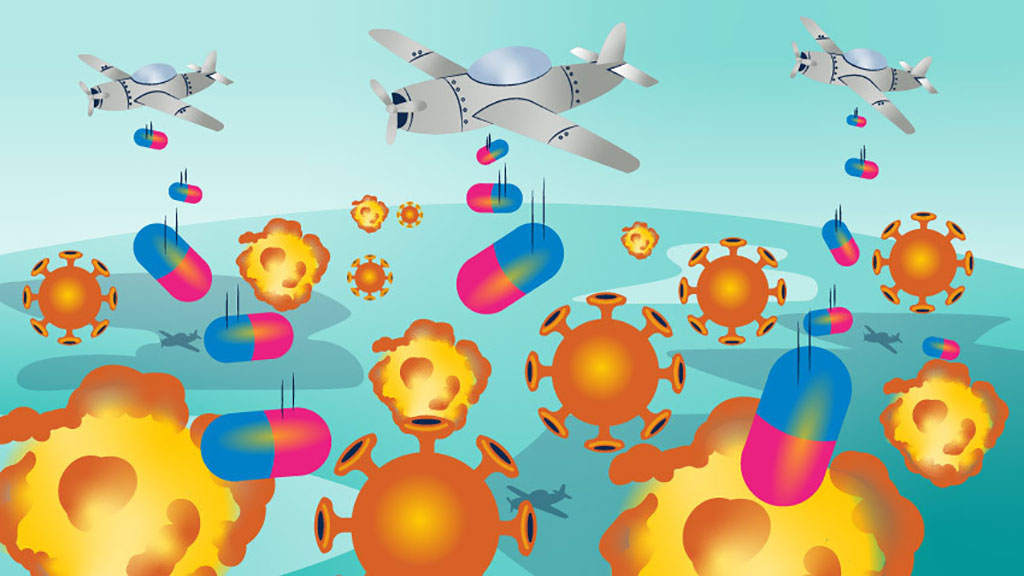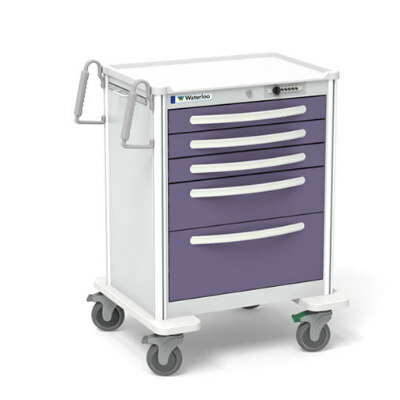Groundbreaking Study Uses AI-Powered Image Cell Analysis to Identify New COVID-19 Drug Available at Local Pharmacies
|
By HospiMedica International staff writers Posted on 24 Aug 2021 |

Image: Groundbreaking Study Uses AI-Powered Image Cell Analysis to Identify New COVID-19 Drug Available at Local Pharmacies (Photo courtesy of Justine Ross, Michigan Medicine)
A new groundbreaking study has revealed several drug contenders already in use for other purposes that have been shown to block or reduce SARS-CoV-2 infection in cells, including one dietary supplement that is already available at local pharmacies.
The study by researchers at the University of Michigan (Ann Arbor, MI, USA) used artificial intelligence (AI)-powered image analysis of human cell lines during infection with the novel coronavirus. The cells were treated with more than 1,400 individual FDA-approved drugs and compounds, either before or after viral infection, and screened, resulting in 17 potential hits. Ten of those hits were newly recognized, with seven identified in previous drug repurposing studies, including remdesivir, which is one of the few FDA-approved therapies for COVID-19 in hospitalized patients.
The team validated the 17 candidate compounds in several types of cells, including stem-cell derived human lung cells in an effort to mimic SARS-CoV2 infection of the respiratory tract. Nine showed anti-viral activity at reasonable doses, including lactoferrin, a protein found in human breast milk that is also available over the counter as a dietary supplement derived from cow’s milk. The team is soon launching clinical trials of the compound to examine its ability to reduce viral loads and inflammation in patients with SARS-CoV2 infection. Remarkably, the study also identified a class of compounds called MEK-inhibitors, typically prescribed to treat cancer, that appear to worsen SARS-CoV2 infection. The finding sheds light on how the virus spreads among cells. The next step will be to use electronic health records to see whether patients on these drugs have worse COVID-19 outcomes.
“Traditionally, the drug development process takes a decade—and we just don’t have a decade,” said Jonathan Sexton, Ph.D., assistant professor of Internal Medicine at the U-M Medical School and one of the senior authors on the paper. “The therapies we discovered are well positioned for phase 2 clinical trials because their safety has already been established.”
“Repurposing existing therapeutic interventions in the clinical setting has many advantages that result in significantly less time from discovery to clinical use, including documented safety profiles, reduced regulatory burden, and substantial cost savings,” said George A. Mashour, M.D., Ph.D., co-director of MICHR and founder/executive sponsor of the Center for Drug Repurposing.
Related Links:
University of Michigan
The study by researchers at the University of Michigan (Ann Arbor, MI, USA) used artificial intelligence (AI)-powered image analysis of human cell lines during infection with the novel coronavirus. The cells were treated with more than 1,400 individual FDA-approved drugs and compounds, either before or after viral infection, and screened, resulting in 17 potential hits. Ten of those hits were newly recognized, with seven identified in previous drug repurposing studies, including remdesivir, which is one of the few FDA-approved therapies for COVID-19 in hospitalized patients.
The team validated the 17 candidate compounds in several types of cells, including stem-cell derived human lung cells in an effort to mimic SARS-CoV2 infection of the respiratory tract. Nine showed anti-viral activity at reasonable doses, including lactoferrin, a protein found in human breast milk that is also available over the counter as a dietary supplement derived from cow’s milk. The team is soon launching clinical trials of the compound to examine its ability to reduce viral loads and inflammation in patients with SARS-CoV2 infection. Remarkably, the study also identified a class of compounds called MEK-inhibitors, typically prescribed to treat cancer, that appear to worsen SARS-CoV2 infection. The finding sheds light on how the virus spreads among cells. The next step will be to use electronic health records to see whether patients on these drugs have worse COVID-19 outcomes.
“Traditionally, the drug development process takes a decade—and we just don’t have a decade,” said Jonathan Sexton, Ph.D., assistant professor of Internal Medicine at the U-M Medical School and one of the senior authors on the paper. “The therapies we discovered are well positioned for phase 2 clinical trials because their safety has already been established.”
“Repurposing existing therapeutic interventions in the clinical setting has many advantages that result in significantly less time from discovery to clinical use, including documented safety profiles, reduced regulatory burden, and substantial cost savings,” said George A. Mashour, M.D., Ph.D., co-director of MICHR and founder/executive sponsor of the Center for Drug Repurposing.
Related Links:
University of Michigan
Latest COVID-19 News
- Low-Cost System Detects SARS-CoV-2 Virus in Hospital Air Using High-Tech Bubbles
- World's First Inhalable COVID-19 Vaccine Approved in China
- COVID-19 Vaccine Patch Fights SARS-CoV-2 Variants Better than Needles
- Blood Viscosity Testing Can Predict Risk of Death in Hospitalized COVID-19 Patients
- ‘Covid Computer’ Uses AI to Detect COVID-19 from Chest CT Scans
- MRI Lung-Imaging Technique Shows Cause of Long-COVID Symptoms
- Chest CT Scans of COVID-19 Patients Could Help Distinguish Between SARS-CoV-2 Variants
- Specialized MRI Detects Lung Abnormalities in Non-Hospitalized Long COVID Patients
- AI Algorithm Identifies Hospitalized Patients at Highest Risk of Dying From COVID-19
- Sweat Sensor Detects Key Biomarkers That Provide Early Warning of COVID-19 and Flu
- Study Assesses Impact of COVID-19 on Ventilation/Perfusion Scintigraphy
- CT Imaging Study Finds Vaccination Reduces Risk of COVID-19 Associated Pulmonary Embolism
- Third Day in Hospital a ‘Tipping Point’ in Severity of COVID-19 Pneumonia
- Longer Interval Between COVID-19 Vaccines Generates Up to Nine Times as Many Antibodies
- AI Model for Monitoring COVID-19 Predicts Mortality Within First 30 Days of Admission
- AI Predicts COVID Prognosis at Near-Expert Level Based Off CT Scans
Channels
Artificial Intelligence
view channel
AI-Powered Algorithm to Revolutionize Detection of Atrial Fibrillation
Atrial fibrillation (AFib), a condition characterized by an irregular and often rapid heart rate, is linked to increased risks of stroke and heart failure. This is because the irregular heartbeat in AFib... Read more
AI Diagnostic Tool Accurately Detects Valvular Disorders Often Missed by Doctors
Doctors generally use stethoscopes to listen for the characteristic lub-dub sounds made by heart valves opening and closing. They also listen for less prominent sounds that indicate problems with these valves.... Read moreCritical Care
view channel
Powerful AI Risk Assessment Tool Predicts Outcomes in Heart Failure Patients
Heart failure is a serious condition where the heart cannot pump sufficient blood to meet the body's needs, leading to symptoms like fatigue, weakness, and swelling in the legs and feet, and it can ultimately... Read more
Peptide-Based Hydrogels Repair Damaged Organs and Tissues On-The-Spot
Scientists have ingeniously combined biomedical expertise with nature-inspired engineering to develop a jelly-like material that holds significant promise for immediate repairs to a wide variety of damaged... Read more
One-Hour Endoscopic Procedure Could Eliminate Need for Insulin for Type 2 Diabetes
Over 37 million Americans are diagnosed with diabetes, and more than 90% of these cases are Type 2 diabetes. This form of diabetes is most commonly seen in individuals over 45, though an increasing number... Read moreSurgical Techniques
view channel
Miniaturized Implantable Multi-Sensors Device to Monitor Vessels Health
Researchers have embarked on a project to develop a multi-sensing device that can be implanted into blood vessels like peripheral veins or arteries to monitor a range of bodily parameters and overall health status.... Read more
Tiny Robots Made Out Of Carbon Could Conduct Colonoscopy, Pelvic Exam or Blood Test
Researchers at the University of Alberta (Edmonton, AB, Canada) are developing cutting-edge robots so tiny that they are invisible to the naked eye but are capable of traveling through the human body to... Read more
Miniaturized Ultrasonic Scalpel Enables Faster and Safer Robotic-Assisted Surgery
Robot-assisted surgery (RAS) has gained significant popularity in recent years and is now extensively used across various surgical fields such as urology, gynecology, and cardiology. These surgeries, performed... Read morePatient Care
view channelFirst-Of-Its-Kind Portable Germicidal Light Technology Disinfects High-Touch Clinical Surfaces in Seconds
Reducing healthcare-acquired infections (HAIs) remains a pressing issue within global healthcare systems. In the United States alone, 1.7 million patients contract HAIs annually, leading to approximately... Read more
Surgical Capacity Optimization Solution Helps Hospitals Boost OR Utilization
An innovative solution has the capability to transform surgical capacity utilization by targeting the root cause of surgical block time inefficiencies. Fujitsu Limited’s (Tokyo, Japan) Surgical Capacity... Read more
Game-Changing Innovation in Surgical Instrument Sterilization Significantly Improves OR Throughput
A groundbreaking innovation enables hospitals to significantly improve instrument processing time and throughput in operating rooms (ORs) and sterile processing departments. Turbett Surgical, Inc.... Read moreHealth IT
view channel
Machine Learning Model Improves Mortality Risk Prediction for Cardiac Surgery Patients
Machine learning algorithms have been deployed to create predictive models in various medical fields, with some demonstrating improved outcomes compared to their standard-of-care counterparts.... Read more
Strategic Collaboration to Develop and Integrate Generative AI into Healthcare
Top industry experts have underscored the immediate requirement for healthcare systems and hospitals to respond to severe cost and margin pressures. Close to half of U.S. hospitals ended 2022 in the red... Read more
AI-Enabled Operating Rooms Solution Helps Hospitals Maximize Utilization and Unlock Capacity
For healthcare organizations, optimizing operating room (OR) utilization during prime time hours is a complex challenge. Surgeons and clinics face difficulties in finding available slots for booking cases,... Read more
AI Predicts Pancreatic Cancer Three Years before Diagnosis from Patients’ Medical Records
Screening for common cancers like breast, cervix, and prostate cancer relies on relatively simple and highly effective techniques, such as mammograms, Pap smears, and blood tests. These methods have revolutionized... Read morePoint of Care
view channel
Critical Bleeding Management System to Help Hospitals Further Standardize Viscoelastic Testing
Surgical procedures are often accompanied by significant blood loss and the subsequent high likelihood of the need for allogeneic blood transfusions. These transfusions, while critical, are linked to various... Read more
Point of Care HIV Test Enables Early Infection Diagnosis for Infants
Early diagnosis and initiation of treatment are crucial for the survival of infants infected with HIV (human immunodeficiency virus). Without treatment, approximately 50% of infants who acquire HIV during... Read more
Whole Blood Rapid Test Aids Assessment of Concussion at Patient's Bedside
In the United States annually, approximately five million individuals seek emergency department care for traumatic brain injuries (TBIs), yet over half of those suspecting a concussion may never get it checked.... Read more
New Generation Glucose Hospital Meter System Ensures Accurate, Interference-Free and Safe Use
A new generation glucose hospital meter system now comes with several features that make hospital glucose testing easier and more secure while continuing to offer accuracy, freedom from interference, and... Read moreBusiness
view channel
Johnson & Johnson Acquires Cardiovascular Medical Device Company Shockwave Medical
Johnson & Johnson (New Brunswick, N.J., USA) and Shockwave Medical (Santa Clara, CA, USA) have entered into a definitive agreement under which Johnson & Johnson will acquire all of Shockwave’s... Read more















